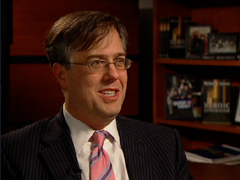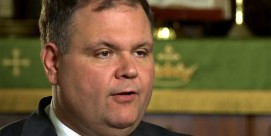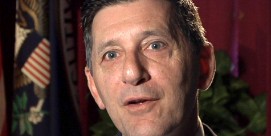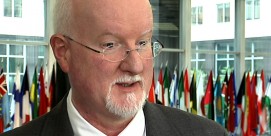In This Episode << SLIDE LEFT TO SEE ADDITIONAL SEGMENTS
Michael Gerson Extended Interview
Read more of Kim Lawton’s October 30, 2007 interview with Michael Gerson, author of HEROIC CONSERVATISM: WHY REPUBLICANS NEED TO EMBRACE AMERICA’S IDEALS (AND WHY THEY DESERVE TO FAIL IF THEY DON’T):
 Q: What is heroic conservatism?
Q: What is heroic conservatism?
A: Well, I had a lot to do when I worked on Capitol Hill with the creation of the idea of compassionate conservatism. That was very much domestic-focused. It was trying to find ways to use conservative and free market ideas in the Republican Party to help the poor and the addicted and children at risk. But now, since 9/11, I needed a broader concept to also encompass a commitment to human rights and dignity abroad. I was very involved in the AIDS program in the administration, in Africa, in genocide in Sudan, in malaria programs. I think these things are good for America’s soul. I think they’re good for our interest. They’re essential to our politics, and so I wanted to make an argument that conservatism cannot just be for free markets, but also for helping children in Africa. Conservatism is not just pro-life, and I am pro-life, but it’s also pro-poor. It’s a way to help people to compete in the economy and get on the social ladder of accomplishment. So that’s the kind of conservatism that I believe in, and I wanted to argue for it in my new book.
Q: What are the foundations for that? You talk a lot about the Declaration of Independence, for one.
A: There are a couple of streams here. For any conservative or any Republican, you have to take Abraham Lincoln seriously, and the book does. He believed, and it was controversial in his time, in universal human rights and dignity and believed that abolition was the natural outgrowth of those ideas. But the big argument in the Republican Party right now, as I see it, is between a libertarianism which is really market-oriented anti-government, and I make the argument that the other perspective is Roman Catholic social thought, this set of ideas that’s been developed over the last several decades that says that government should be limited because communities need to be protected. Families are important, values are important, but also a principle called solidarity, which is the belief that the justice of a society is judged by its treatment of the poor and the weak. Now that’s a little different. That’s a different kind of conservatism, a conservatism of the common good that argues that we need to orient our policies towards people that might not even vote for us, need to make sure that we’re inclusive and hopeful and oriented towards opportunity, and, you know, there’s a backlash against that type of conservatism right now, and so I wanted to argue for idealism in a tired time.
Q: Why is it necessary for conservatives to be focusing on things like that?
A: Well, I think there’s a strong international argument. I’m senior fellow at the Council on Foreign Relations. I’m focused on a lot of these issues. We have found increasingly that when other societies are hopeless and failed that we get all sorts of threats that arise to America, from drug trafficking to criminal gangs to terrorism to a variety of things. So we have a direct national interest in the hope of others in that way, fighting disease, promoting development, and it is one of the unheralded accomplishments of the Bush era. The president increased spending on development assistance at a greater percentage than at any time since the Marshall Plan in response to the largest effort to fight a single disease in human history, the AIDS plan. And so that’s been one of the focuses. But I also think that one of my worst moments at the White House was the aftermath of Katrina. I went down with the president. We met people who had never had a bank account, had almost no connection to the mainstream economy in America, deep problems rooted in the history of slavery and segregation. But the reality here is that in the aftermath of that disaster Republicans were focused mainly on the cost of recovery, budget. Democrats were focused mainly on the apportionment of blame. Very few people in our political system took the broader issues of race and poverty seriously. That’s disappointing. It’s something we eventually have to confront. We have events like the LA riots or Katrina that temporarily reveal these deep inequities in American society, but then it’s gone. Then we don’t pay attention until the next time that some disaster or some crisis or some problem comes up, and eventually we need to confront these issues. That’s a message for Democrats and Republicans. Now I believe that Republicans can offer good, market-oriented, conservative ideas to meet those needs and should be involved in that competition of ideas to achieve, really, social justice, not just individual liberty.
Q: What is the role of religion in this notion of heroic conservatism?
A: Well, you know, in American history this deep commitment to human rights and dignity, to the dignity of every individual whether they’re an American citizen or a child in Africa — that comes from two sources. It comes from a philosophic tradition, the Enlightenment, the set of beliefs that came out of that philosophic belief, and from the Judeo-Christian tradition, a belief that human beings are created in the image of God. We’ve always had both those elements in the American tradition in forming these views, and they’re still both there in many ways. Many people in America believe in human rights and dignity and these issues because of their faith. They have an anthropology that’s related to their deepest beliefs. So I also argue in the book that a kind of secularism that rules those motivations out of bounds is actually a dangerous thing. It would really rule out of bounds one of the main sources of social change, reform, and justice in our history. From abolition to progressivism to the civil rights movement to the pro-life movement today to people who fought for the suffrage, the rights of women — all these movements in American history had strong roots, not exclusively but often, in religious faith, and we can’t rule those things out a priori.
Q: A lot of faith-based liberals might say, “We’ve been involved with human rights, we’ve been involved with poverty.” What makes this an essentially conservative idea?
A: Well, I want to argue that those things need to be important to conservatives, and I see a shift taking place. My tradition that I came from might be called conservative Protestantism. When I was growing up, the social movement that expressed those aspirations was really the religious right, which took a certain form associated with the Republican Party, and there were useful things about the religious right. It built ties between Roman Catholics and Protestants that hadn’t existed before. It brought evangelicals back into the public square. They had withdrawn after the fundamentalist-modernist controversy earlier in the century. But I think that model of engagement of the religious right is fading in many ways. A new generation of leaders, people like Rick Warren and others, have a broader notion of what social justice means. It’s not just issues of sexual morality, although they’re still important — abortion, and family, those sort of things. But also things like economic justice for the poor and racial reconciliation and the hope of other people in foreign lands. So many conservative Protestants now are increasingly motivated on issues that relate to Africa, for example. I’ve seen example after example in the fight against disease and the promotion of hope. That’s a good trend, it seems to me. It’s a broadening of this religious perspective of conservative Christians, and they’re looking for a new model of social engagement. What comes next after the religious right? I think there’s a lot of experimentation around what that is right now. So part of the purpose of my book was to give some form to that as well. I think it’s possible to be a conservative, to believe in moral tradition, to believe in family, to believe in community in the way that conservatives do, and still have an aggressive focus on these issues of justice.
Q: When you talk in the book about the president trying to move this kind of philosophy forward, you recount of backlash, a lot of obstacles being put up by other political people. How much resistance is there within the Republican Party, even among the religious right, to some of these ideas?
A: I found a lot of resistance. First of all, for example, in the faith-based initiative, which some people have dismissed as radical — it’s not at all. We’ve always used faith-based organizations to help provide social services to the poor. They do a great job. Catholic Charities, Lutheran Social Services — there’s a tradition of using these institutions. The attempt of the administration was to try to move beyond some of those larger traditional institutions and get it to faith-based community institutions, African-American, Hispanic community institutions at the grassroots level, and make them more sophisticated in requesting and receiving funds and such. When we proposed these ideas early in the administration, there was almost no interest among conservative leaders on Capitol Hill. It’s almost as if they didn’t even know how to talk about them, and that’s a genuine problem. They thought that they were — some people thought that they were too liberal, because the goal was to help the poor. Some people thought they were too expensive: Why are we spending this money? Some people thought it’s just not our job: We’re Republicans; we’re supposed to just play around with the tax code. There’s always that kind of resistance in the Republican Party. But on the other side I can’t be cynical about the power of government to do good, because I sat in the Oval Office. I watched the president of the United States make the decision to spend $15 billion on non-citizens in Africa, to put 2 million people on AIDS drugs who would have died otherwise, to take the preeminent leadership role in the world on AIDS, which America now has. Then I’ve been in Africa. I’ve visited an orphanage in Ethiopia with 400 HIV positive children, all of whom have lost both parents to AIDS or were abandoned because they have AIDS. Up to a few years ago every single one of them died before 7, 8, 9, 10, 11 years old. Now almost none of them are dying because of the generosity of the American people. So I know it’s possible. Government can do good under the right circumstances, with the right theory, with the right approach. I think conservatives need to recognize that. I think there are moral reasons to recognize that. I also think there are good political reasons, too, because eventually it’s necessary for a presidential candidate to appeal to a broad variety of people, to appeal to people who don’t normally vote Republican. That’s necessary in American politics. But I’m afraid I don’t see too much of that right now in the Republican Party, so I’m making those arguments.
Q: You speak in the book about what you called President Bush’s “religiously informed moralism” that was behind some of these policies. You wrote about it as if it were a good thing. But a lot of people hear that kind of language, and it’s a scary thing for them. How do you tell people, or how do you try to make that argument to people for whom that kind of notion is very scary?
A: Well, the argument I make is to put it into theological terms — I was a theology student — is that I don’t believe when it comes to religion that issues of salvation are relevant to politics. I don’t believe issues of church organization, ecclesiology are relevant to politics. I don’t think theories of the end times are relevant to politics. Those are private beliefs, okay? But an anthropology, a belief about human beings and their nature and value has always been important to politics. It informed the American founding. It still informs our view of our role in the world. So people who are suspicious of the president’s religious beliefs, one response to make is it’s one reason he cares so much about dissidents in foreign countries, the reason he was willing to take major efforts to fight disease in foreign countries. These are also expressions of a religiously informed moralism in American foreign policy. And I found, for example, in the lead up to the G8 summit in Glen Eagles when I was pushing for the president’s malaria initiative, an initiative that would help hundreds of thousands of people in Africa, mainly children under 5 who die from malaria, there was serious opposition within the administration. But whenever I could get an idea like that — well-formed, serious, well put together idea — to the president, on this agenda, he was the biggest supporter. So some of that at least comes from his faith and his view of America in the world. It’s a very American view, that everybody has value, that everybody has rights, that everybody has dignity, and that America should be a force for good in the world. That’s not unique to this president. I think you would have found the same thing in John Kennedy, the same thing in Franklin Roosevelt, the same thing in Harry Truman. That’s the mainstream of the American foreign policy tradition. There’s always been a moral element in that way.
Q: How do you answer those who ask how that is different from Osama Bin Laden, putting forward a religiously motivated vision of the world?
A: Well, I guess my response to that would be that the content of religion actually makes a difference. There’s a difference between the Takfiri radical Islamic command to kill those who don’t share your beliefs, including Muslims, and the command to love and serve your neighbor. Those are two different teachings. I don’t condemn all of Islam. I think Islam has many strong and good traditions about human rights, dignity in kind of the tradition of monotheism. But there are elements of radical Islam, just as there have been radical elements within Christianity, that teach a denial of human rights and dignity. So I guess my response would be the problem’s not religion. The problems are teachings, really just teachings, some of which undermine human dignity and some of which promote it greatly. So the question here really is do you really want to say we’re going to take religion out of politics, okay? It wouldn’t just get rid of Osama Bin Laden and maybe Pat Robertson. It would also get rid of Martin Luther King. That was his primary motivation, his basic conviction and belief. So I think you have to be a little more careful and discriminating. The problem here is not religion. The problem is hate.
Q: Does America have a moral obligation to promote democracy around the world?
A: I do think we have a moral calling. We were called “the new order of the ages” when we were founded. It was a belief that would be an example to other countries — that was a very American belief. The reason was because we weren’t founded on a nationalistic commitment. We were founded on a universal philosophic belief: All men are created equal. Very few countries were founded that way. We were, and it’s given us a certain role in the world. But I’d have to say in the aftermath of 9/11 it’s not just a moral mandate that comes from our history. It’s also a national security priority. These threats to America arise from regions of the world dominated by hopelessness, failure, ideologies of hate, economic stagnation. America has an interest in those countries having representative governments that serve their people, that make economic progress for their people. That’s a long-term commitment. It’s not something that’s going to be achieved overnight, but that’s the mainstream of American internationalism. Most American presidents have believed that the American people benefit from the spread of a liberal international order; free trade, representative self-government, rule of law, women’s rights — all these basic commitments, and I think that’s true. I think that we do benefit in the long run. I think Europe benefited from the spread of those values. It led to greater peace on that continent after the last century had been a century of conflict within Europe, and I think we have to apply the same rules and ideas to the Middle East in particular. I mean, these are stagnant societies producing people in ideologies who want to kill our citizens. The ultimate answer there is actually the hope of the people themselves. Now there are a lot of other answers. You have to fight terrorism. You have to promote a variety of ideological alternatives. But ultimately I think hope is the answer to hatred.
Q: Did you change your mind about this or anything while you were inside the White House, seeing it from the inside? How did you change?
A: You know, I made clear in the book — I mean I have some serious criticisms on the conduct of the Iraq war, okay, particularly for the first couple of years, which I think — there was really a failure of vision as far as military strategy in that circumstance and a refusal to adjust in a quick and nimble fashion. I make the case that the aftermath of Katrina was disappointing. So I think I learned some lessons while I was there. These things are not easy. They’re difficult. But, you know, I’ll say I’ve written an honest book but it’s not a tell-all, in a certain sense. I know how hard it is. When you see things from the outside it looks easy. When you’re inside there are a thousand issues and debates that come at you every day, and you’re forced to make decisions in tight timetables with limited information. It’s easy to second-guess in those circumstances. So I did learn that it’s easy to second-guess the Clinton administration. It’s easy to second-guess other administrations, and I think it’s given me more sympathy in a certain way for what others have faced in these circumstances, and made me understand that it’s only the hardest issues that get to that building, in the West Wing. I guess I have more understanding for the people who have held that job.
Q: You’re known as one of the presidential speech writers who helped put together some of the language people have talked about a lot, certainly a lot of the religious allusions. At one point there was a lot of chatter that there were religious codes being sent out for only the people who could understand them. What was going on with all of that?
A: Well, you know, we did use some religious allusions to hymns, to Scripture and these things, but every president has used those. I mean, when Ronald Reagan used a city on a hill he wasn’t quoting the Pilgrims. He was quoting the New Testament. When Martin Luther King talked about a promised land of freedom, he was talking about the Book of Exodus. There’s a long tradition of this. So the argument I’ve made there is these aren’t code words. They are our culture. Millions of people understand them, and just because some people don’t get them doesn’t mean there’s some kind of plot. I think it’s basic cultural literacy in many ways to know these basic allusions to great literature and to Scripture. That’s been part of our tradition. To give one more example: When Lincoln said a house divided against itself cannot stand, he was quoting the Sermon on the Mount. It wasn’t making it up. It was using an allusion from Western culture that most people knew. So, I mean, you know, we certainly did that. It fit the president’s inclinations. It fit my reading of American political rhetoric. I think that without those things that American rhetoric would be infinitely impoverished, without those references and ideas. I don’t think it’s a violation of pluralism. I think it’s the assertion of our culture, and I don’t think it should be offensive, in a certain way, because all presidents have done this.
Q: How much of those presidential speeches are you and how much are they the president?
A: Well, first of all, I had a great team of writers, people I worked with on a variety of projects, very talented people. Six people worked for me. We had a large operation. The president had one to three public events a day, so it’s a major production in that way. But on the major speeches — a speech to the United Nations, a State of the Union address — the president was involved early and heavily. He wanted to see an early outline, which I’d provide to him after consulting with our policy experts, particularly on a State of the Union or a speech like that. He’d respond to me by phone: Why don’t we say this here or why doesn’t this go here, why aren’t we saying this? Then once he had an imprint on the outline we’d produce a draft, which would go to the senior staff. There’d be a lot of input from other people. It’s always a cooperative enterprise when we do these things. But the president then would start to mark it up and do changes in the speech even when we practiced it. We would do teleprompter practice. So by the time he delivered a major speech, one of the large ones, every word was pretty much his. He was involved. He wasn’t just reading words. He’d really had an imprint on them. He took the word seriously. But that’s great for a speech writer. It meant that I spent time with him. It meant that he was accessible. It meant that he cared about the things I cared about. It made the job more enjoyable in a lot of ways.
Q: Why do the words matter?
A: Well, I saw, for example, after 9/11 in the Washington National Cathedral speech, where the president had to express shock, sorrow, sympathy, and resolve of the nation all in 12 minutes. In a time of great national vulnerability people didn’t know what had hit. There were still people walking around the ruins with pictures of loved ones wondering if they were dead or alive. These were fresh wounds in America, and I sat there in that cathedral and realized the words really counted at that point. They don’t always. You do a lot of speeches when you’re at the White House, hundreds of them. But at a few moments the words really matter. That was a moment when the country needed to be inspired, informed, brought to the next step. That was true on the September 20th speech to the Joint Session of Congress when he began to lay out the Afghan campaign and the basic commitments of the war on terror. It’s been true in a few other times, particularly when America is in shock — mourning after a shuttle tragedy or other things like that. So, you know, the reality is the words don’t always make that much difference, but in a few historical moments, they do. People remember them, and it means something.
Q: How do you assess the role religion is playing so far in this campaign season?
A: To be honest with you, in the Republican Party you see a lot of appeal to religious voters among various candidates who are trying to prove they’re the most conservative. But I don’t find a particularly creative appeal, in a certain way. These seem to be perfunctory issues that are being dealt with. The president, when he appealed to religious voters, particularly in the year 2000, did it with creative policy ideas on the faith-based initiative — education reform and a variety of things that were, appealed to something that values voters care about, which is helping others, and I don’t see much of that in the Republican Party now. In the Democratic Party, both of the main candidates speak a comfortable language of religion, Obama and Hillary Clinton. Hillary Clinton comes from a very strong, liberal Protestant tradition, social justice tradition. She’s very comfortable talking about those issues. It’s not like some other leaders of the party that have been deeply secular and uncomfortable with those things. So I think Democrats actually have the language side better, in a certain way. But my concern there is that on issues of concern to a lot of religious voters there’s very little flexibility. One of my favorite Democrats of all times was Governor Casey of Pennsylvania, who was a Catholic, pro-life, social justice Democrat. I think somebody like that could compete for a lot of religious voters in America. But you don’t find too many who represent that viewpoint of values-based Catholic social justice tradition. That used to be very common in America. It’s not very common in the Democratic Party. He was prevented from speaking at the Democratic Convention because of his pro-life views. I think that’s a symbol for a lot of religious voters, in many ways, is this pro-life commitment about how extreme, in my view, the Democratic Party has become in its promotion of abortion rights and the signal that sends to a lot of more conservative religious voters. That’s hard to overcome. It’s a difficult thing.
Q: But does abortion outweigh all of these other issues you’ve been talking about — human rights and poverty and all of those?
A: Yeah, I wouldn’t say it outweighs, but it certainly gives an indication of a basic attitude towards human life and dignity for a lot of religious voters. It shows someone’s heart in a certain way: Do you care for the weak? There are many Americans who view this as a social justice issue, as the protection of the weak. So it’s a difficult thing for Democrats to overcome. Of course, they can. I’ve suggested in print that if Barack Obama went to the National Association of Evangelicals and said, “I know we disagree on a lot of issues, but I am going to defeat malaria in Africa and save this many million lives. I promise you this as president. I want you to join me,” there’d be a lot of evangelicals who’d applaud that. I think they could have a much more creative outreach, in a certain way, because all these issues are important. They’re all pro-life issues in a certain way, when you’re talking about human rights and dignity abroad. So I think Democrats could be even more effective on that agenda.
Q: In your book you still seem to have a lot of affection for George W. Bush, and you still speak about him with a lot of regard. What do you want Americans to know about him that perhaps they don’t know? His approval rating is pretty low. What do you want people to know about him that you saw working with him?
A: Well, you know, I saw a man who was sometimes sharp, sometime demanding, but always had a good heart. When I could get an innovative policy idea to him, when I could get something that appealed to the conscience he was always the biggest supporter in the system. You know, for me, that took a job that could be very demanding, very frustrating, and gave me, you know, hope that it could matter because, you know, he often has said when he likes a foreign leader or other things that he thinks their heart is good. But I saw that his heart is good. Now that’s not everything in politics. You know, I know that there are a lot of other standards by which a leader is judged. But I can only talk about what I saw for seven years, really, both as governor and as president. I saw somebody who was loyal to those around him. He treated people well, cared about many of the issues that I cared about deeply, particularly as related to Africa. And I look at, you know, the legacy. So much of it will depend on Iraq. But the reality here is that tens of millions of people have prescription drug coverage under Medicare because the president cared about it. Test scores for minority children in schools are increasing because of the No Child Left Behind bill. Millions of people are going to be on AIDS treatment, millions of people are going to be helped to survive malaria, and these things are maybe overshadowed by Iraq, but they are not undone by Iraq. They are still real. They are things that I saw, and I think that they are going to reflect well, eventually, on the president, if historians are more fair than journalists.






